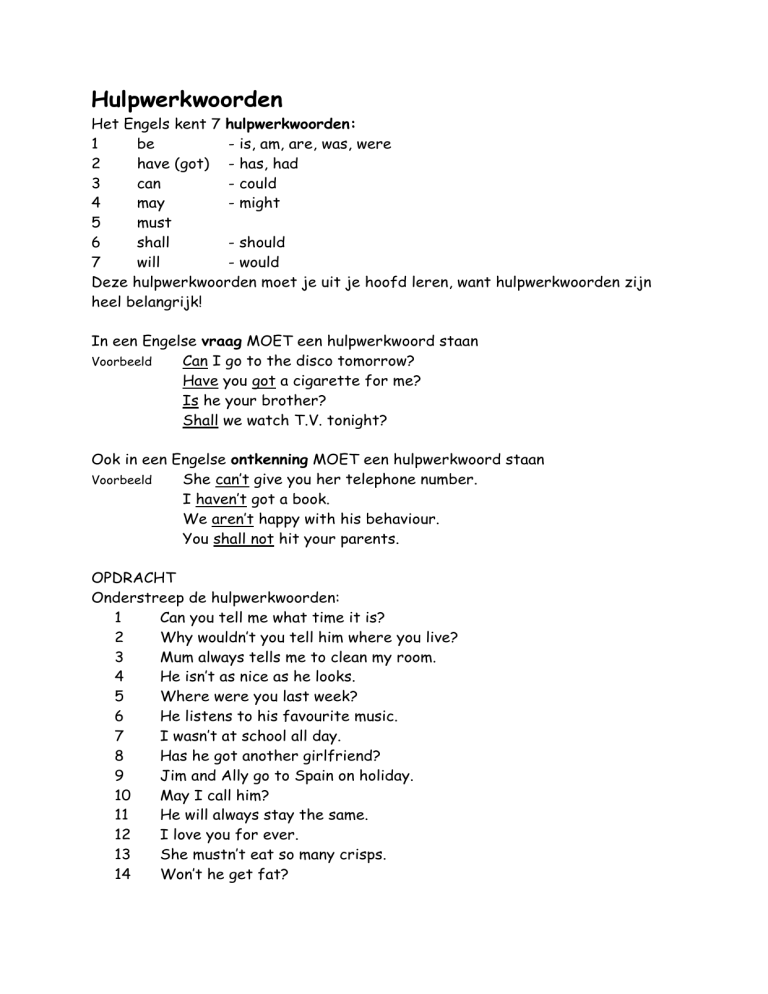
Hulpwerkwoorden
Het Engels kent 7 hulpwerkwoorden:
1
be
- is, am, are, was, were
2
have (got) - has, had
3
can
- could
4
may
- might
5
must
6
shall
- should
7
will
- would
Deze hulpwerkwoorden moet je uit je hoofd leren, want hulpwerkwoorden zijn
heel belangrijk!
In een Engelse vraag MOET een hulpwerkwoord staan
Voorbeeld
Can I go to the disco tomorrow?
Have you got a cigarette for me?
Is he your brother?
Shall we watch T.V. tonight?
Ook in een Engelse ontkenning MOET een hulpwerkwoord staan
Voorbeeld
She can’t give you her telephone number.
I haven’t got a book.
We aren’t happy with his behaviour.
You shall not hit your parents.
OPDRACHT
Onderstreep de hulpwerkwoorden:
1
Can you tell me what time it is?
2
Why wouldn’t you tell him where you live?
3
Mum always tells me to clean my room.
4
He isn’t as nice as he looks.
5
Where were you last week?
6
He listens to his favourite music.
7
I wasn’t at school all day.
8
Has he got another girlfriend?
9
Jim and Ally go to Spain on holiday.
10
May I call him?
11
He will always stay the same.
12
I love you for ever.
13
She mustn’t eat so many crisps.
14
Won’t he get fat?
Help, er staat geen hulpwerkwoord in de zin!
In veel zinnen staat helemaal geen hulpwerkwoord.
Als je zo’n zin vragend of ontkennend wilt maken moet je do of does erbij
gebruiken.
Voorbeeld
You hate this school.
Do you hate this school?
You don’t hate this school.
Wanneer gebruik je DO?
Do gebruik je als de zin in de tegenwoordige tijd staat.
Voorbeeld
You love me.
We work at the supermarket.
Do you love me?
Do we work at the supermarket?
You don’t love me.
We don’t work at the supermarket.
Wanneer gebruik je DOES?
Does gebruik je als de zin in de tegenwoordige tijd staat en het onderwerp
he, she of it is
Voorbeeld
He loves me.
She reads a book.
Does he love me?
Does she read a book?
He doesn’t love me.
She doesn’t read a book.
Let op: er staat altijd maar 1 keer een –s achter het werkwoord in de zin!
Als je het moeilijk vindt om zinnen vragend of ontkennend te maken volg dan
deze stappen:
1 kijk of er al een hulpwerkwoord in staat (be, have got, can, may, must,
shall, will)
2 JA: gebruik dit hulpwerkwoord om de zin vragend of ontkennend te maken
door het, net als in het Nederlands, bij een vraag vooraan te zetten en bij
een ontkenning not achter het hulpwerkwoord te zetten.
3 NEE
4 he, she, it (maar ook “the table, my sister etc): gebruik DOES (de –s
achter het werkwoord gaat naar ‘does’).
5 Is het onderwerp I, you, we of they (maar ook the children of my parents
etc) dan DO
OPDRACHT
Maak de volgende zinnen vragend en ontkennend
Voorbeeld
He buys vegetables every day.
Does he buy vegetables every day?
He doesn’t buy vegetables every day.
1 My mother likes to go to bed early.
2 He sees to like her.
3 You should listen more carefully.
4 This looks like a jungle.
5 They’re always on time for their appointment.
6 He’s the one who hit me.
7 Michael understands what you are saying.
8 I might be able to come on Saturday.
9 The fire is in the back yard.
10 He hits me hard on the head.
11 We can give you the book on Friday.
12 Jane will eat this bread roll for breakfast.
13 I love my mother and father.
14 George shows me his new t- shirt.
15 Helen and Peter meet me at the station.
16 The thief runs away.
17 The big dog is in the garden
18 Billy goes to school every day.
19 Dad will give you a hand.
20 His sister’s always on time.












